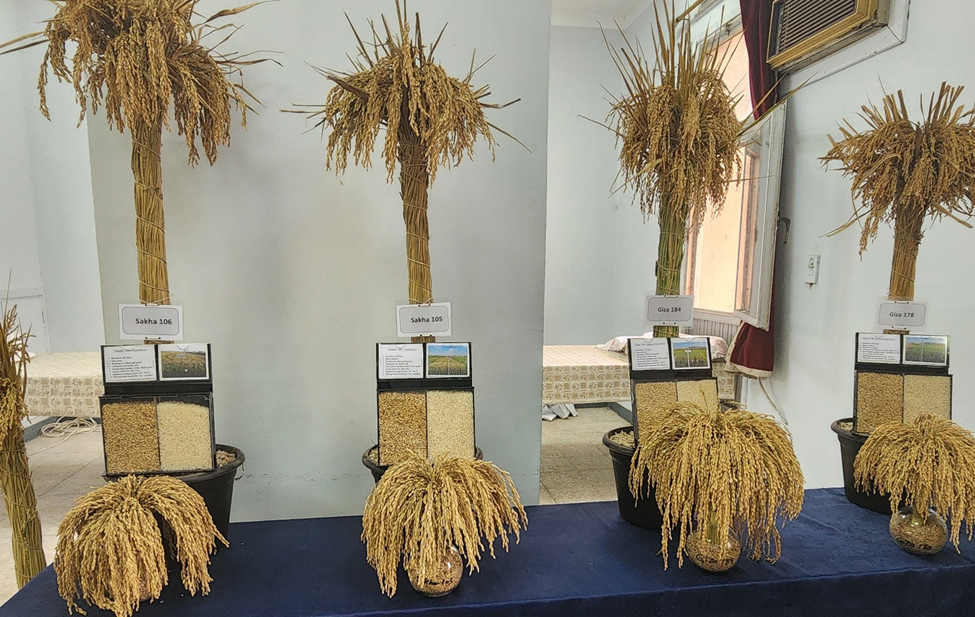AfricaRice and Egypt convey an African ministerial meeting for rice self-sufficiency on the continent
- Oct 20, 2025
- 4 min read

Cairo, Egypt — The Journey to Rice Self-Sufficiency in Africa took a big leap forward at the High-Level Forum on Rice Self-Sufficiency in Africa: Peer-to-Peer Learning from Egypt's Experience, held from 7 to 9 October 2025 at the Safir Hotel in Cairo. The event was co-organized by the AfricaRice Center (AfricaRice) and the Agricultural Research Centre (ARC) of Egypt and hosted by The Egyptian Ministry of Agriculture and Land Reclamation. The forum brought together African Ministers of Agriculture, governors, researchers, and private sector representatives from across the continent to explore practical pathways to achieve food self-sufficiency.
AfricaRice at the heart of a continental vision
Opening the high-level meeting, Dr Baboucarr Manneh, Director General of AfricaRice, stressed the urgent need for Africa to produce enough rice to feed its growing population. "Africa still imports more than 40 percent of the rice it consumes," he noted, "but the solutions are within our reach – through collaboration, technology transfer and strong partnerships among our member states."
Dr. Manneh highlighted AfricaRice's pivotal role as the continent's leading research organization dedicated to advancing rice-based agrifood systems. With 28 member countries, six research stations, and a network of working groups, AfricaRice continues to serve as the scientific backbone of Africa's rice transformation program, connecting innovation, policy, and practice.
The Director General's remarks set the tone for a dynamic exchange of experiences and lessons learned from Egypt's remarkable achievements in rice production. Over the past three decades, Egypt has increased its average rice yields from 5.7 tons per hectare in 1995 to 10 tons per hectare in 2025, while reducing its water consumption by nearly 30 percent.
The Egypt Model: A Master Plan for Rice Development in Africa
In his remarks, H.E. Mr. Alaa Farouk, Egypt's Minister of Agriculture and Land Reclamation, reaffirmed his country's commitment to supporting African nations in achieving agricultural transformation. "Egypt's leaders are committed to sharing their expertise to help our African brothers and sisters achieve self-sufficiency in strategic crops such as rice, maize and wheat," he said.
The forum highlighted Egypt's integrated model combining research innovation, irrigation efficiency and policy coherence. Through its Rice Research and Training Center (RRTC), established in collaboration with USAID and IRRI, Egypt has launched high-yielding, climate-resilient rice varieties, such as Sakha Super 300, Giza 183 and Sakha 105, while reducing water consumption by 30 percent through modern irrigation systems.

Egypt Rice varieties
AfricaRice, through its long-standing partnership with ARC, plays a pivotal role in ensuring that these innovations are shared across the continent. The two institutions are currently working on regional technology transfer mechanisms and capacity-building programs to replicate Egypt's success in member countries.
National Perspectives: Shared Challenges, Common Opportunities
During the country sessions, delegates from Madagascar, Liberia, Senegal, Nigeria, Sierra Leone, the Democratic Republic of Congo, Guinea and Guinea-Bissau shared their ideas on their respective rice sectors. Although challenges such as weak mechanization, limited research funding, poor water management, and post-harvest losses persist, all agreed on the need for coordinated action, rooted in AfricaRice's regional leadership.
AfricaRice's interventions, ranging from the provision of salt-tolerant threshers and varieties to strengthening seed systems, have been recognized as key drivers of resilience and productivity in various agro-ecological zones.
Ministerial Reflections: Lessons for Africa's Rice Revolution

A ministerial panel moderated by H.E. Mr. Papa Abdoulaye Seck, former Minister of Agriculture of Senegal and member of the Board of Directors of AfricaRice, distilled key lessons from Egypt's experience. The discussion focused on the following points:
Coherent agricultural policies in favour of smallholder farmers;
Investments in irrigation to enable year-round production;
Strengthening funding for agricultural research;
Integration of research and extension systems; and
Strong public-private partnerships to develop innovation.
These ideas, echoed by participants, reaffirmed AfricaRice's role in facilitating policy dialogues and knowledge exchange among member states to ensure evidence-based agricultural transformation.
AfricaRice's commitment to a collaborative future
The Forum's communiqué stressed that rice self-sufficiency in Africa will require more than technology: it requires institutional coordination, policy coherence and investment in human capital. AfricaRice Deputy Director-General, Dr. Prem Bindraban stressed the need for a balanced approach combining technical, socio-economic and institutional solutions.
"Collaboration is our greatest strength," he said. "AfricaRice stands ready to support our member countries through capacity building, technology transfer, and regional networks that connect science to farmers' fields."
To translate commitments into action, several bilateral initiatives have been launched, including cooperation agreements between Egypt and Nigeria, Guinea, Liberia and Sierra Leone, covering areas such as seed systems, water management and training of rice value chain actors.
Field Visit: Science in Action

The meeting included a practical visit to the Egyptian Rice Research and Training Centre in Kafr El-Sheikh, where the delegates observed demonstration plots and met with Egyptian scientists. The visit showcased the country's latest high-yielding varieties and highlighted the importance of integrating research, training and extension – a model that AfricaRice is helping to replicate across Africa.
A shared vision for food security in Africa

Field Visit
The High-level Forum concluded with a renewed spirit and a spirit of partnership. AfricaRice, in collaboration with ARC and the continent's Ministries of Agriculture, has reaffirmed its commitment to building a self-sufficient, competitive and sustainable rice sector in Africa.
As Dr. Manneh so aptly stated, "The journey to rice self-sufficiency in Africa begins with knowledge sharing, strong partnerships, and collective action. Together, we can feed Africa.’’













Comments